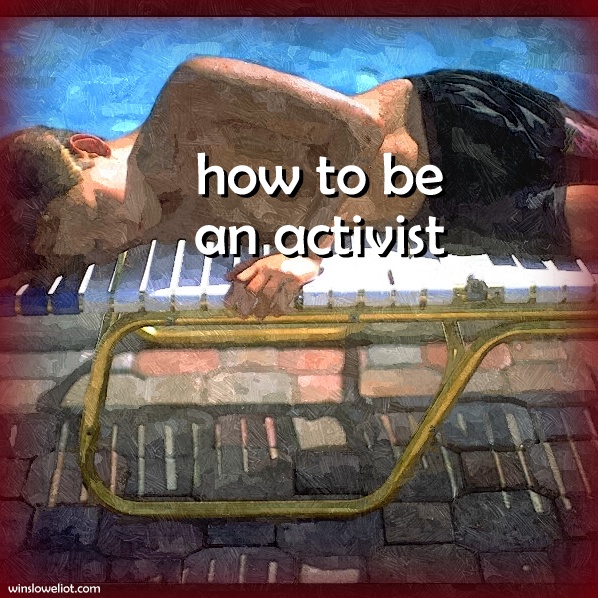
Stillness 8-31: People are always telling us that we have to do something. In our culture, busy-ness is glorified in ways that constantly diminishes aspects of our lives like beauty, harmony, and rest. Work is much more valued than peace. Making money is more important than making friends. Doing your homework is more critical than a good night’s sleep. And on and on.
One of the most challenging things for those of us who are fighters and who want to take part in a culture of change for the better is not knowing what to do. How can we help? Where can we march? Who do we write to? How can we take part? What is our role in this great change that is happening—this crucial stand for justice, equality, well-being, freedom, and love—for all people, creatures, and our planet.
So here’s one way to be an activist: Stop being so busy.
Busy-ness is the most distracting and useless activities we fill our time with. It’s an old and revolting idea that if we’re not busy we are somehow naughty. That the devil loves idle hands. That if we don’t do our chores, we’re not allowed to play. Servants were (and in some places still are) required to work far beyond their physical, mental, and emotional capabilities. Children worked in factories or forced up chimneys, men sent into coal mines or war, women worked—unpaid—day in and day out and if they didn’t work hard enough, they were easily discarded. In some cultures, a goat or a donkey was more valuable than a wife as a commodity. And let’s always remember the grim history of slavery and all its continued repercussions.
People do die from overwork. They really do—you can look it up. Our culture of busy-ness has created an ethos of stress, exhaustion, hopelessness, and helplessness. We are always drowning because there is always more to do, and when we’re not doing it we feel bad. Guilt and pressure are our constant companions. We’re taught to believe that if we’re not being productive, we’re not useful.
But ask yourself this: who benefits from your busy-ness?
One way to be an activist is to actively change our glorification of busy-ness. Choose to rest instead. Give other people the opportunity to rest. A friend I hadn’t seen in a long while came to visit me and she looked so tired! Instead of chatting and catching up, I suggested she lie down on my couch and take a nap. She was horrified at first, but, with my prodding, she did lie down, and she did sleep. She needed the rest so badly. So what if we weren’t busy catching up on old times? This felt so much better.
When I wrote What Would You Do If There Was Nothing You Had To Do? back in 2012, I outlined practices to help clear the layers of busy crud and debris that prevent us from living into our fullest potential as happy, grateful, and helpful human beings. But it hasn’t been until this more recent time of serious isolation that I’ve seen how stillness is actually a form of activism.
I recently discovered artist, minister, and activist Tricia Hersey, and felt she was a rare kindred spirit. She writes: “We believe rest is a form of resistance and name sleep deprivation as a racial and social justice issue.” Her organization is called “The Nap Ministry.” She says: “Rest is a form of resistance because it disrupts and pushes back against capitalism and white supremacy.” (You can find out more about Tricia Hersey and The Nap Ministry here.)
I agree with my whole heart. Rest is a form of resistance. There are all sorts of ways to be an activist. Resisting the pressure to be busy and productive all the time is one way. Try being still. Try resting.
